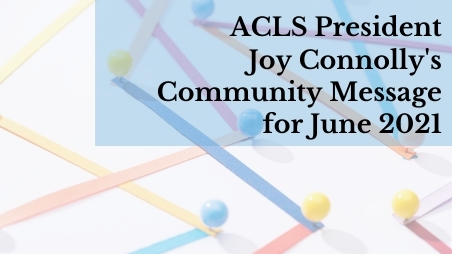ACLS Community Message for June 2021

Here at ACLS we are steaming into summer – quite literally for those of us in the New York area, as we walk through increasingly busy streets during the first intense heat of the year, hoping for a sustained return to good health for all.
Last week we wrapped up the first phase of our Luce Design Workshop for a New Academy, which brought together teams from six schools along with a dozen individual participants including past university presidents, founders of interdisciplinary humanities programs, and representatives from architecture and other fields outside the liberal arts’ traditional domain. Our goal was and is to draw on design thinking to help us identify the most pressing challenges ahead of us in the humanities and social sciences: flat or declining undergraduate enrollments, the persistence of siloes across departments and schools, and tough questions about the lack of diversity among our students and faculty. Energy was high as we talked through the pros and cons of concrete solutions: changing doctoral admissions procedures, expanding the criteria for hiring and tenure review, making available new technologies and institutional spaces for circulating research, approaching the formation of research questions in new ways that engage students or community members, and more.
This week we are heading into the second session of this year’s instantiation of our three-year Intention Foundry, a Mellon Foundation-funded collaborative project linking learned society directors, scholars of color (with a special focus on emerging scholars), and college and university administrators and senior faculty. Organized around the “moonshots” designed by the participating scholars – projects to advance equity field by field, area by area – these all-day meetings have already created new relationships and broadened perspectives.
We’ll tell you more about both experiences later this year. Right now, I want to share one conviction that my experience in the Design Workshop and the Intention Foundry has deepened and that is well worth repeating.
Amazing work is afoot, across the country and beyond, that builds on the effort and imagination of scholars over decades. Interdisciplinary work in environmental humanities, public humanities and public social science, medical humanities, and the study of monuments and cultural heritage; sustained efforts by scholars in disciplines steeped in tradition to connect with the students and publics of today; substantive changes to doctoral education that increase diversity, improve advising, and embrace career diversity; and much, much more. I enter the summer heartened by the energy and vision of colleagues all over the country. Our job at ACLS in the next phases of these projects is to help connect and amplify these and other efforts to strengthen the humanities and social sciences.
We are daily energized by our belief that humanistic scholarship contributes to the common good by helping us understand the world in all its complexities and experience it in new ways. As we emerge from the pandemic, we at ACLS are concentrating on how we can help societies and institutions find the best ways to communicate the value — the necessity! — of our fields and areas of study to students, trustees, taxpayers, and community members.
As we wrap up the academic year, I also feel deep gratitude for the broader ACLS community — fellows, reviewers, past and current board members, institutional funders, learned society executive directors and delegates, representatives of our associate and consortium member institutions, and other wholehearted supporters of the humanities and interpretive social sciences – who have chosen to support our work this year at ACLS. We are buoyed by the generosity of this community.
Our $125 million Centennial Campaign, which surpassed the $100 million mark this year, will conclude in December 2021. Despite COVID-19, it has been an enriching and exciting year for ACLS, made possible by the creativity, intellect, and enthusiasm that we are fortunate to find in our wider community. If you have not contributed to our campaign this year, we welcome your support before the fiscal year ends on June 30. If you would like to become more engaged in our work in the coming academic year, we’d love to hear from you. Meanwhile, please save the date for the ACLS’s 102nd birthday celebration on September 14, 2021 at 4:00 PM EST, which will feature a virtual discussion about the value of the humanities in life and career.
No better start to the summer than to indulge in thoughts of rest by the water, like those summoned up by Yeats.
With best wishes from all of us at ACLS,
The Lake Isle of Innisfree
by William Butler Yeats
I will arise and go now, and go to Innisfree,
And a small cabin build there, of clay and wattles made;
Nine bean-rows will I have there, a hive for the honey-bee,
And live alone in the bee-loud glade.
And I shall have some peace there, for peace comes dropping slow,
Dropping from the veils of the morning to where the cricket sings;
There midnight’s all a glimmer, and noon a purple glow,
And evening full of the linnet’s wings.
I will arise and go now, for always night and day
I hear lake water lapping with low sounds by the shore;
While I stand on the roadway, or on the pavements grey,
I hear it in the deep heart’s core.

